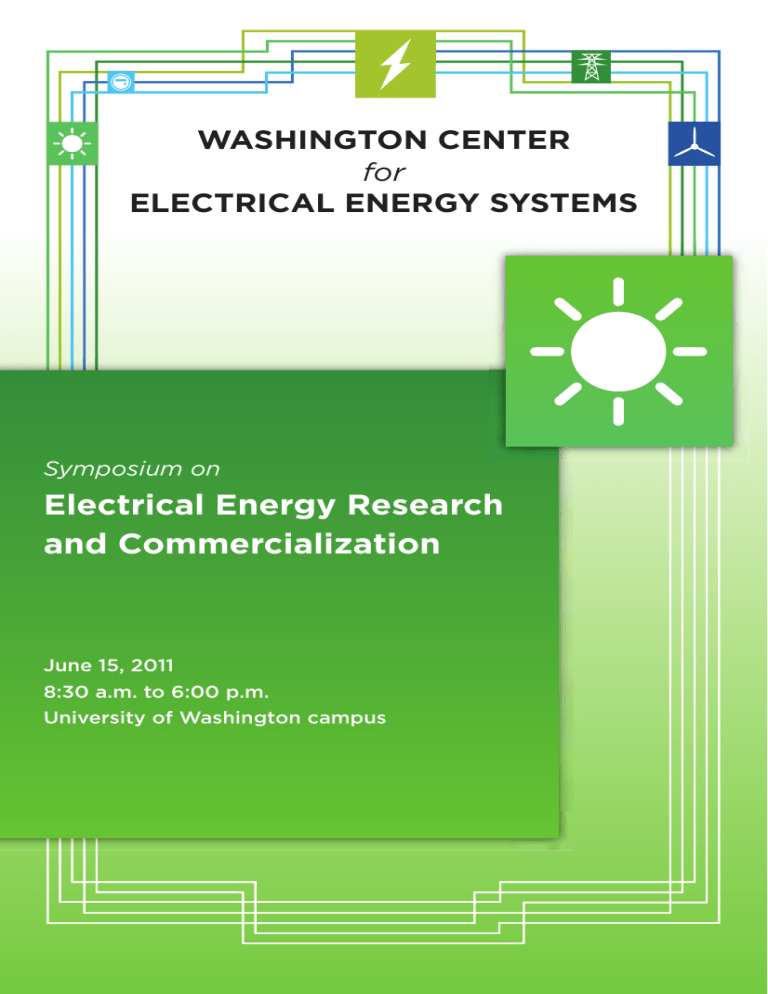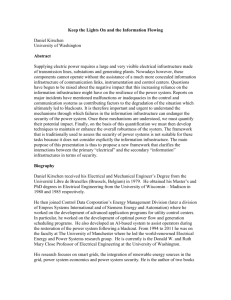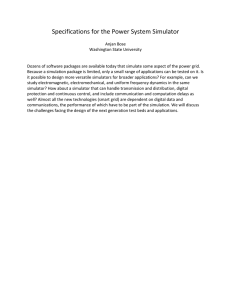Electrical Energy Research and Commercialization WASHINGTON CENTER ELECTRICAL ENERGY SYSTEMS

WASHINGTON CENTER
for
ELECTRICAL ENERGY SYSTEMS
Symposium on
Electrical Energy Research and Commercialization
June 15, 2011
8:30 a.m. to 6:00 p.m.
University of Washington campus
1
Washington Center for
Electric Energy Systems (WAcees)
Welcome to WAcees
Professors Daniel Kirschen, University of Washington, and Anjan Bose, Washington State University, are leading research in power system engineering at their respective universities. They have established the Washington Center for Electric
Energy Systems (WAcees) as an academic-industry-government partnership in the area of smart grids and renewable energy.
The WAcees research focuses on the systems aspects of the smart grid, encompassing system-level architecture, planning, operation, protection and control, as well as computational issues. Specific research topics include flexibility, implementation of energy storage, demand-side participation, optimal investment in distribution networks, and cyber security.
Daniel Kirschen
Phone: (206) 543-2174
E-mail: kirschen@uw.edu
Web: http://www.ee.washington.edu/people/faculty/kirschen/
Anjan Bose
Phone: (509) 335-1147
E-mail: bose@wsu.edu
Web: http://school.eecs.wsu.edu/faculty/bose
More information can be found at: www.wacees.org
2 WASHINGTON CENTER for ELECTRICAL ENERGY SYSTEMS
Welcome from
Matt O’Donnell and Candis Claiborn
Welcome to the Symposium that marks the launch of the Washington Center for
Electric Energy Systems! Energy issues are becoming increasingly important and our two universities are committed to make a significant contribution in this field. We are therefore investing resources in the area of smart grid by hiring new faculty members in Electrical Engineering and by joining forces across institutions, we expect them to deliver even more benefits for the State of Washington.
We look forward to lively discussion about how the State might benefit from the deployment of smart grids, about the research agenda and about how we can develop a fruitful and dynamic partnership between universities, companies and government agencies. Your input is critical and we look forward to working together.
Enjoy the day!
Matt O’Donnell,
Frank & Julie Jungers Dean of
Engineering
University of Washington
Candis Claiborn
Dean and Professor, College of
Engineering and Architecture
Washington State University
Gift for Attendees
Thank you to Belkin for providing us with their Conserve Insight™ Energy Use
Monitors at a discount. Please pick up your Conserve Insight™ as our gift to you. They will be available at our post-symposium reception in the Paul G. Allen
Center.
3
Schedule
Wednesday, June 15, 2011 – Events held in Johnson 102
8:30am
9:00 – 9:15am
9:15 – 9:45am
Continental
Breakfast
Welcome
Overview
Matt O’Donnell, UW Dean of Engineering
Candis Claiborn, WSU Dean of Engineering
Daniel Kirschen, UW
Anjan Bose, WSU
Patricia Hoffman, DOE 9:45 – 10:15am Keynote
10:15 – 10:30am Refreshment
Break
10:30 – 11:45pm Session 1: Vision
11:45– 1:00pm
1:00 – 2:15pm
Moderator: Dave
Kaplan
LUNCH
Session 2: Research agenda
Steve Klein, Snohomish County PUD
Mike Atkinson, Alstom
Daniel Kirschen, UW
Carl Imhoff, PNNL
2:15 – 2:30
2:30 – 3:45
3:45pm
4:00 – 6:00pm
Moderator: Anjan
Bose
Refreshment
Break
Session 3: Commercialization
Ed Schweitzer, Schweitzer Engineering Laboratories
Rogers Weed, WA Department of
Commerce Moderator: Rick
LeFaivre
Closing Remarks Daniel Kirschen,UW
Anjan Bose, WSU
Reception
Atrium, Paul G. Allen Center for Computer Science &
Engineering
4 WASHINGTON CENTER for ELECTRICAL ENERGY SYSTEMS
Campus Map
DIRECTIONS TO ATRIUM IN PAUL G. ALLEN CENTER:
Exit Johnson Hall and walk toward the Drumheller fountain. Walk around the fountain on the left-side, and continue along the left-side of the Electrical Engineering building. The large, double-door entrance to the Atrium will be at the end of the Electrical Engineering building, on your right.
Johnson Hall
Parking Lot Entrance
Allen Atrium
Wi-Fi Internet Access
Connect to the Univesity of Washington wireless network, then use the following for your login information:
UW NetID: event0723
Password: wt63/op79/px68
5
Speakers
Mike Atkinson
Michael Atkinson has been Managing Director,
Americas and China, since June 2008 and is based in Redmond. He leads Alstom’s Automation
Systems business, with responsibilities in numerous areas including sales, contracts, marketing and finance. As a worldwide leader in the development of Smart Grid solutions for the energy industry,
ALSTOM Grid’s products and systems ensure the reliability, quality and safety of the transmission and distribution of electricity. ALSTOM Grid enables their customers to operate and maintain efficient environmentally friendly global networks.
Michael Atkinson heads Alstoms Automation Systems Business Units in the
Americas and China. As a worldwide leader in the development of solutions for the energy industry, Alstom’s products and systems serve to transmit and distribute electricity, ensure the reliability, quality and safety of energy flows, and operate efficient networks through information management. Alstom is one of the world’s leading companies serving transmission and distribution customers in over 100 countries.As the Managing Director, Americas and China, of Alstom’s
Automation Systems Business, Atkinson is responsible for setting a clear strategic vision for the Alstom Automations sites located within these regions and to properly structure and lead the management teams therein to achieve worldwide goals. His responsibilities encompass sales and tendering, project execution and delivery, contract management, quality, marketing, finance and people development.
Prior to joining Alstom GRID in 2006, Atkinson worked in the engineering software field for Aspen Technology. Throughout his career at Aspen Tech, he held positions of increased responsibility in business consulting, product marketing, and product management. Previous to Aspen Tech, he spent 15 years in the Engineering and Construction industry, involved in all phases of large-scale project management and delivery for the Process Industries (petrochemical, chemical, polymer, and oil & gas). Atkinson obtained his Master’s in Business Administration at Clemson University, Clemson, SC in 1991. He obtained his Bachelor of
Science degree in Mechanical Engineering at Virginia Tech, Blacksburg, VA in
1985. He is a registered Professional Engineer.
6 WASHINGTON CENTER for ELECTRICAL ENERGY SYSTEMS
Anjan Bose
Dr. Anjan Bose has over thirty-five years of experience in industry and academia, as an engineer, educator and administrator. He is well known as a technical leader in the power grid control industry, a researcher in electric power engineering, an educator in engineering, and an administrator in higher education.
At Washington State University, Dr. Bose holds the endowed Distinguished Professorship in Power
Engineering, and is the Site Director of the NSF sponsored Power System Engineering Research
Center. From 1998 to 2005 he served as the Dean of the College of Engineering and Architecture which has about 150 faculty, 75 staff members, and 2500 students over four campuses. During that period, the college doubled its annual research expenditures and donations while the state and tuition budgets decreased. From 1993 to 1998, he was the Director of the School of Electrical Engineering and Computer Science which is the largest unit in the college.
Before joining WSU, Dr. Bose was on the faculty of Arizona State University, where he directed the Electric Power Research Laboratory, a cooperative research program (supported by the local power industry) that he helped establish in
1982. Before ASU, Dr. Bose worked for Control Data Corporation in their
Energy Management Systems Division (now Siemens Energy Management
& Information Systems). He administered a research group of over a dozen professionals and played a crucial role in the technical leadership of the division
($50 million yearly revenue), which became the leading vendor of power system control centers during this time.
He has served on several editorial boards of IEEE publications and the McGraw-
Hill Encyclopedia of Science & Technology. He has also served, some as chair, on several international technical committees and conference organizations. He was appointed by the governor to the board of directors of the Washington Technology Center (served as Vice-Chair for three years), and by the US Secretary of
Energy on the committee to study the 1999 and 2003 power blackouts. He has consulted for many electric power companies and related government agencies throughout the world.
7
Candis Claiborn
Dr. Candis Claiborn has been Dean of the College of Engineering and Architecture since 2006 and is one of just a few women engineering deans in the
U.S. As dean, she has contributed to the growth of the college through several successful initiatives.
She is a co-Principal investigator on a $3.75 million,
NSF ADVANCE grant that aims to increase representation and advancement of faculty women in science, technology, engineering, and mathematics. The grant is developing new strategies for faculty recruitment, retention, and advancement.
She is also principal investigator on a Department of Education grant to establish a program for recruitment, promotion, and advancement of women in science and engineering.
During her tenure as dean, several scholarships for women in engineering fields have been established.
Dr. Claiborn joined the WSU faculty in 1991 and is a well-known researcher in the area of air quality. She served as the college’s associate dean of research and graduate programs from 2002 to 2005. At WSU, she has collaborated with researchers in the Laboratory for Atmospheric Research to study atmosphericbiospheric interactions of trace gases. She also developed a research program in atmospheric aerosols, in which she collaborates with colleagues in the Laboratory for Atmospheric Research, as well as others in the School of Public Health at the University of Washington, the Chemistry Department at Eastern Washington
University, and Lawrence Berkeley National Laboratory.
Dr. Claiborn has received several teaching awards in her department, including
Outstanding Teaching Faculty in Civil Engineering in 1994, the Leon Luck Faculty Award for the Most Effective Professor in Civil and Environmental Engineering in 1998, the Outstanding Teaching Faculty in Civil Engineering in 1999 and the Richard Crain Faculty Award for Distinction in Ethics Teaching in 2003.
Dr. Claiborn received her B.S. in Chemical Engineering from the University of Idaho in 1980. After graduation, she worked in the petroleum industry for
Chevron and then for Atlantic Richfield Corporation. She returned to college at North Carolina State University, where she received her Ph.D. in Chemical
Engineering.
8 WASHINGTON CENTER for ELECTRICAL ENERGY SYSTEMS
Patricia Hoffman
Patricia Hoffman was named Assistant Secretary
(AS) for the Office of Electricity Delivery and
Energy Reliability (OE) at the United States
Department of Energy (DOE) in June 2010 after serving as Principal Deputy Assistant Secretary
(PDAS) for OE since November 2007. Assistant
Secretary Hoffman provides leadership on a national level on electric grid modernization, enhancing the security and reliability of the energy infrastructure and facilitating recovery from disruptions to the energy supply. This is critical to meeting the Nation’s growing demand for reliable electricity by overcoming the challenges of our
Nation’s aging electricity transmission and distribution system and addressing the vulnerabilities in our energy supply chain.
During her tenure as PDAS, Ms. Hoffman oversaw OE’s $4.5 billion in funding under the American Recovery and Reinvestment Act, to invest in the deployment of smart grid technologies to reduce electricity costs, increase reliability, and give consumers more choice and control over their energy use. Additionally, these
Recovery Act funds support the long-term, coordinated transmission planning; the development of interoperability standards that will enable smart grid devices to communicate in an efficient and secure way; and workforce development support to enhance the electric power system workers skills essential to modernize the grid.
Ms. Hoffman has over 14 years of experience at the Energy Department developing and managing technology research programs critical to the electric sector.
She developed OE’s long-term research strategy and improved its management portfolio of research programs for modernizing and improving the resiliency of the electric grid. This included developing and implementing sensors and operational tools for wide-area monitoring, energy storage research and demonstration and the development of advanced conductors to increase the capacity and flexibility of the grid. She also initiated a new research effort focused on integrating and distributing renewable energy through the electric grid, such as promoting plug-in hybrid electric vehicles and implementing smart grid technologies to maintain system reliability.
Ms. Hoffman holds a Bachelor of Science and a Master of Science in Ceramic
Science and Engineering from Pennsylvania State University
9
Carl H. Imhoff
Mr. Imhoff manages Pacific Northwest National
Laboratory’s (PNNL) Electric Infrastructure Market
Sector, which conducts advanced electric infrastructure research and product development with
USDOE, state governments, vendors and commercial energy firms. In this role he is responsible for
PNNL’s R&D programs on innovations in the areas of advanced power transmission reliability concepts, demand response, development of improved integration concepts for renewable energy generation technologies, policy and strategy for Smart
Grid concepts, and cross-cutting grid analytic tools in visualization and high performance computing.
PNNL grid activities are widely recognized for substantial impact and thoughtleadership in the current “smart grid” agenda at the center of power system innovation and policy in the U.S.
Mr. Imhoff has spent 29 years at the PNNL conducting and managing a broad range of energy research. His technical work emphasizes systems engineering and operations research in the areas of power system reliability, smart grid, energy efficiency, energy storage and clean generation. Mr. Imhoff earned his
B.S. at the University of Arkansas in Industrial and Systems Engineering and his
M.S.I.E. from Purdue University.
Dave Kaplan
David Kaplan is a Seattle-based innovator and entrepreneur who concentrates on smart grid and supporting power industry technologies. In 2006 he founded V2Green to deliver information technology solutions that capture the full economic value of connecting electric vehicles with the power grid.
He served as chairman, CEO, and chief technology officer until the company’s 2008 acquisition by
GridPoint, after which he led the Electric Vehicle
Business Management unit until February 2009.
Earlier in his 30-year technology career he worked at Microsoft and Impinj. Kaplan holds degrees in economics and operations research and is the inventor or co-inventor of more than a dozen patented or patent-pending technologies.
10 WASHINGTON CENTER for ELECTRICAL ENERGY SYSTEMS
Daniel S. Kirschen
Daniel S. Kirschen was appointed Close Professor of Electrical Engineering in 2011. From 1994 to
2010, he was Professor of Electrical Energy Systems and Head of the Electrical Energy and Power
Systems research group at the University of
Manchester (previously UMIST) in Great Britain.
Prior to joining the academic world, he worked for
Control Data Corporation and Siemens-Empros on the development of advanced application software for electric utilities.
When running a power system to supply electrical energy to homes and businesses, engineers strive to satisfy three objectives: providing a reliable service, minimizing the cost of providing this energy, and facilitating the use of renewable energy sources;
Unfortunately, these objectives conflict. Kirschen focuses on techniques that achieve the optimal balance between these three essential goals. In particular, using advanced optimization techniques, Kirschen and his students explore how flexibility resources (such as demand-side participation, energy storage and agile generating units) should be deployed and operated. This is the essence of what has recently been called the “smart grid”. In this respect, Kirschen is also working with colleagues who are specialists in communications, sensors and control to explore how these rapidly evolving technologies can be harnessed to help meet the objectives mentioned above.
While integrating these objectives is an important part of Kirschen’s work, he also does research on each of these topics taken separately. For example, he and his students have developed probabilistic techniques to assess the operational security of power systems. As part of this strand of work, they are exploring the complex mechanisms that lead to blackouts in large power systems. He has also studied electricity markets and written a widely used textbook on power system economics. The next challenge in this area is to develop mechanisms which will ensure that competitive electricity markets deliver sufficient investments to meet the evolving needs of the electricity supply system.
Daniel Kirschen received his Electrical and Mechanical Engineer’s degree from the Free University of Brussels in Belgium and his Master’s and PhD degrees in
Electrical Engineering from the University of Wisconsin-Madison.
11
Steve Klein
Steve Klein was appointed General Manager of
Snohomish County PUD on April 10, 2006. Before joining the PUD, he headed Tacoma Power. Mr.
Klein is recognized for his expertise and vision with smart grid and the integration of advanced telecommunications technology with the electric delivery system. He is also a leader in the study and development of renewable energy, having been instrumental in the filing of the first permits for the study of tidal and geothermal power systems in the
Puget Sound area.
A regional industry leader, Mr. Klein is active on many industry boards and associations, often in a leadership capacity, including:
American Public Power Association (APPA), Board of Directors, CEO Climate
Task Force; Bonneville Power Administration (BPA), Customer Collaborative;
Institute of Electrical and Electronics Engineers (IEEE), Senior Member; Large
Public Power Council (LPPC); Pacific Northwest Utilities Conference Committee (PNUCC), Board of Directors; Public Generating Pool (PGP), Administrative Committee; Public Power Council (PPC), Executive Committee; Economic
Alliance Snohomish County, Board and Executive Committee; Western Energy
Institute (WEI), Board of Directors; Wind Integration, Advisory Committee;
Climate Solutions, Advisory Committee; Washington Clean Technology Alliance
(WCTA), Board and Executive Committee; Washington State Energy Strategy,
Advisory Committee; and Electric Power Research Institute (EPRI) Renewables,
Advisory Committee
12 WASHINGTON CENTER for ELECTRICAL ENERGY SYSTEMS
Rick LeFaivre
Dr. Rick LeFaivre is a partner at OVP Venture
Partners, working out of the firm’s Kirkland,
Washington office. He also serves as director of
New Ventures at the University of Washington
Center for Commercialization, helping to create companies that leverage technology developed at
UW. His investment focus spans traditional information technology ventures as well as companies working at the intersection of computer science, biology and nanotechnology as applied to advanced biotech and energy solutions.
Rick has over thirty years of accomplishment as a computer scientist, professor,
R&D executive, venture investor and board member working at leading universities, high-technology companies and venture capital firms. He has served as VP of the Advanced Technology Group at Apple Computer, as SVP of R&D and CTO at Borland International, and held R&D leadership positions at Silicon
Graphics, Sun Microsystems and Tektronix. He was a founding partner of IdeaEdge Ventures, a San Diego-based venture development organization, and the
Software Patent Institute, which advises the government on issues related to software patentability. He started his career as a professor in the computer science department at Rutgers, The State University of New Jersey, teaching and carrying out research in artificial intelligence and advanced programming technology, and later served as executive director of the Von Liebig Center for Entrepreneurism and Technology Advancement at the University of California, San Diego, focused on the effective commercialization of university-developed technology. Rick has published extensively in the computer science literature, has served on a number of industry and academic advisory boards, and has testified before the Congress of the United States on matters of technology policy.
Dr. LeFaivre received his AB in mathematics from the University of Missouri, and his MS and Ph.D. in computer sciences from the University of Wisconsin. He was the founding chair of the University of Wisconsin Computer Sciences Board of Visitors, and is a member of the University of Washington College of Engineering Visiting Committee, the University of Washington Information School
Founding Board, the Pacific Northwest National Laboratory Energy and Environment Directorate Review Committee, the Washington State Energy Strategy
Advisory Committee and the Pacific Northwest Energy Angels Advisory Board.
He previously served as a member of the Board of Directors of WatchGuard, Inc.
(NASDAQ: WGRD) until the company was taken private in 2006.
13
Edmund O. Schweitzer, III
Dr. Edmund O. Schweitzer, III is recognized as a pioneer in digital protection. He holds the grade of
Fellow of the IEEE and is a member of the National
Academy of Engineering. Dr. Schweitzer is the recipient of the Graduate Alumni Achievement
Award from Washington State University and the
Purdue University Outstanding Electrical and
Computer Engineer Award. In September 2005, he was awarded an honorary doctorate from Universidad Autónoma de Nuevo León in Monterrey,
Mexico, for his contribution to the development of electric power systems worldwide. He has written dozens of technical papers in the areas of digital relay design and reliability and holds more than 70 patents pertaining to electric power system protection, metering, monitoring, and control.
Dr. Schweitzer received his Bachelor’s and Master’s degrees in electrical engineering from Purdue University, and his PhD from Washington State University. He served on the electrical engineering faculties of Ohio University and Washington
State University, and in 1982, he founded Schweitzer Engineering Laboratories,
Inc. to develop and manufacture digital protective relays and related products and services.
Today, SEL is an employee-owned company, which serves the electric power industry worldwide, and is certified to the international quality standard ISO-9001.
SEL equipment is in service at voltages from 5 kV through 500 kV, to protect feeders, motors, transformers, capacitor banks, transmission lines, and other power apparatus.
14 WASHINGTON CENTER for ELECTRICAL ENERGY SYSTEMS
Matthew O’Donnell
Matthew O’Donnell is the Frank and Julie Jungers
Dean of Engineering at the University of Washington since 2006. Under his leadership, the College of
Engineering created a new program in molecular engineering that includes the construction of a dedicated facility scheduled to open in 2012.
Additionally, he advanced key strategic initiatives in the College, including new energy and computational sciences research programs, has grown the overall size and strength of the College through new faculty hires, completed the most successful fundraising campaign in the College’s history, and reinvigorated undergraduate programs through an emphasis on experiential learning.
O’Donnell is a biomedical engineer who is renowned for his interdisciplinary focus. An expert in ultrasound imaging, his research uses coherent energy sources for non-invasive biomedical imaging. His specific research interests include ultrafast optics, in-vivo microscopy, catheter imaging of coronary arteries, optoacoustic arrays, and elasticity and molecular imaging.
O’Donnell is currently the principal investigator on two National Institutes of
Health grants dealing with applications of ultrasound and photoacoustic imaging. He has graduated 25 Ph.D. students and mentored 15 post-doctoral fellows.
He holds 55 patents and has authored or coauthored more than 300 publications.
In addition, he is associate editor of the journal Ultrasonic Imaging, a fellow of both the technology professional organization IEEE and the American Institute for Medical and Biological Engineering, and a member of the American Physical
Society. O’Donnell was elected this past February to the National Academy of
Engineering— one of the highest professional honors accorded an engineer. And he was recognized by Notre Dame with the 2009 Distinguished Alumnus Award.
He received both his undergraduate and doctoral degrees in physics from Notre
Dame. O’Donnell began his career as a postdoctoral fellow and senior research associate in physics and medicine at Washington University in St. Louis. He went on to a research fellowship in electrical engineering at Yale University, and then to a decade of private-sector experience as a research and development physicist at the General Electric Company in New York. Returning to the academy in
1990, O’Donnell joined the faculty of the University of Michigan as a professor of electrical engineering and computer science. He later chaired that university’s biomedical engineering department from 1998 to 2006.
15
Rogers Weed
Rogers Weed was appointed by Gov. Chris Gregoire as Director of the Department of Commerce in
March 2009. As director, Rogers is charged with fulfilling the Governor’s clear mission to grow and improve jobs in Washington State.
Rogers earned a degree in Computer Science from
Duke University and an MBA in Marketing from the Wharton School at the University of Pennsylvania. He started his career as a management consultant focused on strategy and planning for companies in the pharmaceutical, manufacturing and high tech industries. Rogers joined Microsoft in 1990, managing teams in the Windows, Mobile Devices, On-line Content and
Consumer Software Divisions and rising to Vice President over his 15 years with the company. Rogers has also been a board member and volunteer for several
Seattle-based non-profit organizations. He lives in Seattle with his wife and three sons.
16 WASHINGTON CENTER for ELECTRICAL ENERGY SYSTEMS
Washington Center for Electric Energy
Systems Symposium Steering Committee
Dave Bakken, Computer Science Professor, WSU
Rich Christensen, Product Development Organization
Jay Giri, Director, Alstom Grid, Alstom
Chris Heimgartner, Assistant General Manager, Distribution and Engineering
Services at Snohomish PUD
Carl Imhoff, Manager, Electricity Market Sector at Pacific Northwest National
Laboratory
Keith Jones, Executive Director, WSU Research Foundation
Hardev Juj, Director, Bonneville Power Administration
David Kaplan, Entrepreneur in Residence at UW Center for Commercialization
Curt Kirkeby, Senior Electrical Engineer at Avista Corp.
Ed Lazowska, Bill & Melinda Gates Chair in Computer Science & Engineering and Director of UW eScience Institute, Chair of Computing Community
Consortium at UW-CSE
Daniel Malarkey, Deputy Director of Washington State Department of
Commerce Energy Office
Terry Morlan, NW Power & Conservation Council
Rick Vermeers, Chief Electrical Engineer/Director of Engineering at Avista Corp.
Dave Whitehead, Schweitzer Engineering Laboratories, Inc.
17
Notes
18 WASHINGTON CENTER for ELECTRICAL ENERGY SYSTEMS
Notes
19
WASHINGTON CENTER
for
ELECTRICAL ENERGY SYSTEMS
Thank you for attending! Learn more at: http://www.wacees.org/
University of Washington’s Quad
Washington State University’s Bryan Hall
20 WASHINGTON CENTER for ELECTRICAL ENERGY SYSTEMS




